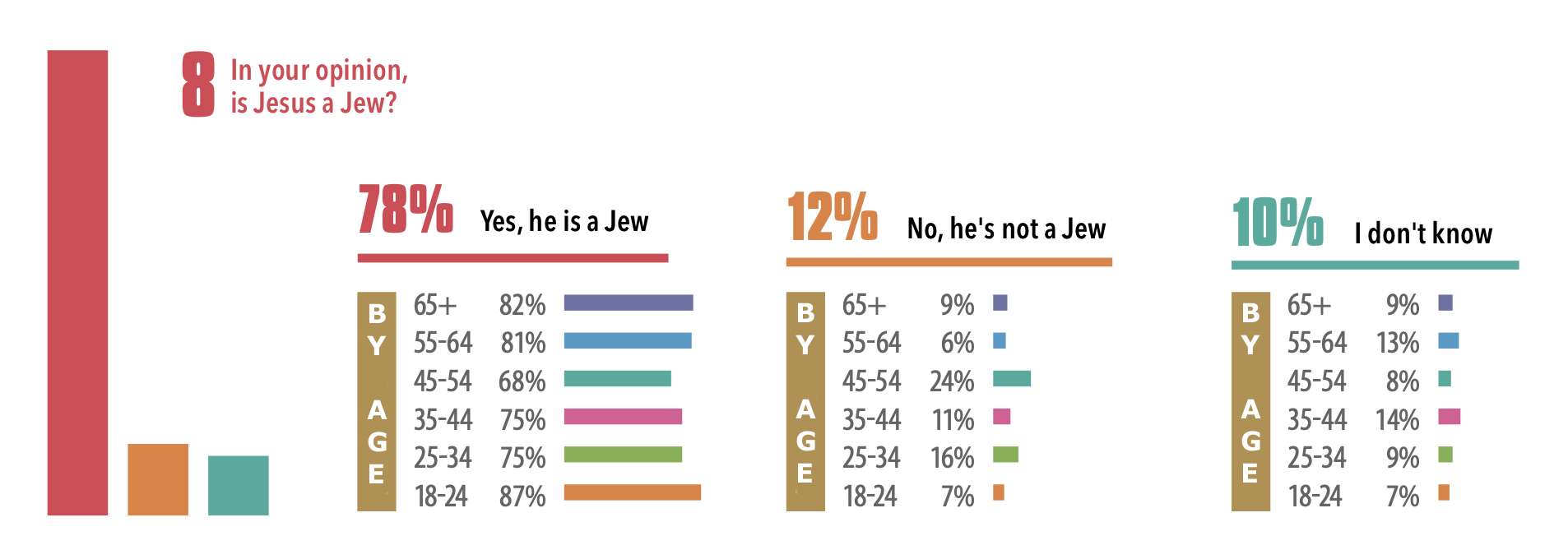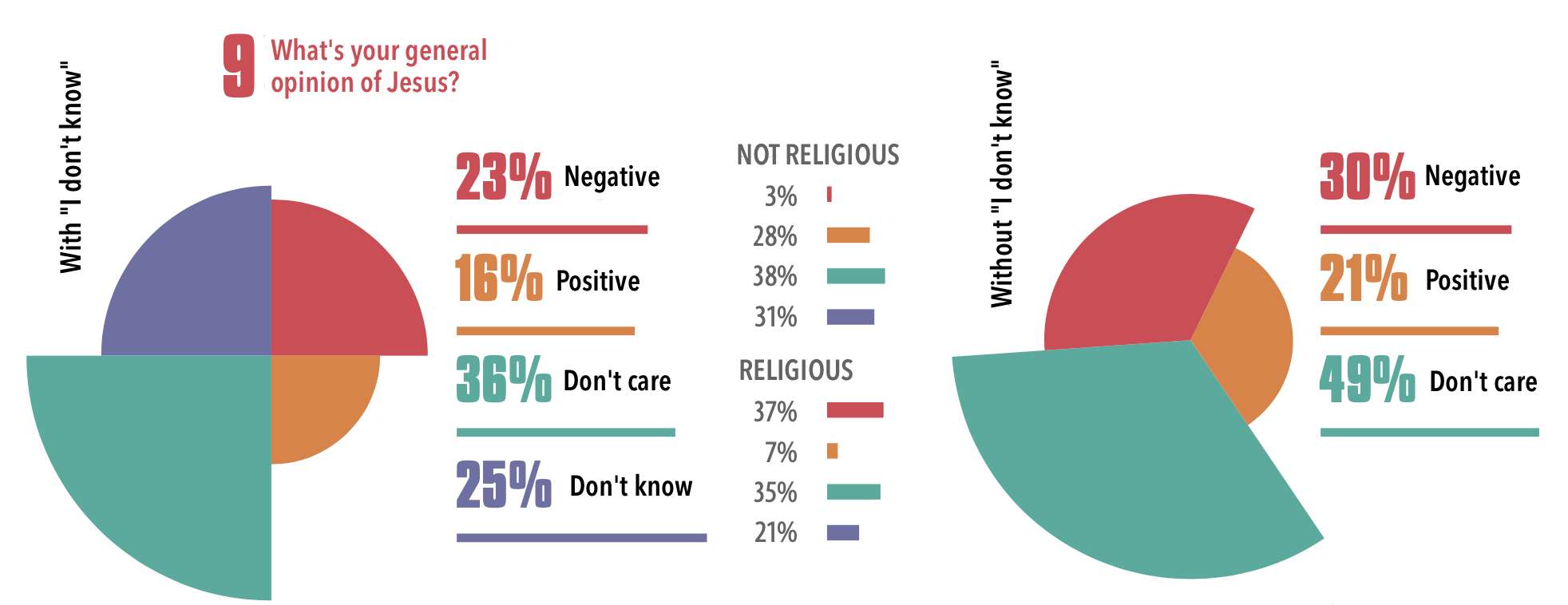We all understand painful history between Jesus and the Jews, the Church and Synagogue. Are Jewish attitudes towards Jesus and Christianity changing since the miraculous return of the Jewish people to Zion, an event that sent shockwaves through Christianity?
We set out to determine just how far these shifting attitudes about Jesus have taken root among Israeli Jews and how the establishment of the State of Israel has changed the way Jews see Jesus, and how Israelis see Christians.
Our survey was conducted among a representative sampling of Israeli Jews.
1. Do you think the support of Christians around the world for the State of Israel is important or not important?
With Israelis engaged in the daily conflict with Middle East Muslim aggression, boycotts, and anti-Israel propaganda, Christian support for the Jewish Nation offers a light in a dark world for three out of every four Israelis (77%) who say yes, Christian support for Israel is important. Christians around the world are recognized for their strong stand with Israel, opposing the geo-political and religious forces working to undermine the Jewish state.
Even many ultra-Orthodox Jews (33%) recognize the importance of Christian support for Israel, which is significant given the distasteful history between the Church and Synagogue. But for multitudes of Hasidic Jews who immigrated to Israel from European shtetels and ghettoes and who now depend on the Jewish State to defend them, they understand the importance of Christian support in a modern world where antisemitism continues to fester.
It is interesting to note that almost all (87%) of the older generation of Orthodox Jews over the age of 65 said that they appreciate Christian support for Israel.
2. As far as you know, compared to other streams of Christianity, do Evangelicals support the State of Israel more or less, or the same?
A large majority (76%) of Israelis said that Evangelicals support the Jewish State more than other Christians.
In general, Catholic, Orthodox and other Protestant churches in Israel and around the world tend to identify with the Palestinian agenda. In large part this is due to the many Palestinian Christians that belong to these denominations. Historical churches in Israel, across the Middle East and North Africa almost exclusively favor the Palestinian/Arab narrative concerning Israel.
In addition to Evangelical political support, the high number of religious Jews who recognize this (76%) also pointed to the humanitarian aid these Christians provide, including feeding the needy in Israel, donations for ambulances, Passover meals, warm clothing and so forth in some of Jerusalem’s poorest Orthodox neighorhoods.
On the other hand, we also found that nearly half (47%) of all Israelis (secular and religious) indicated that they do not know if Evangelical support Israel more than other Christians. To Israeli Jews, a Christian is a Christian be he Catholic, Protestant, Greek Orthodox or otherwise.
Meno Kalisher, a Jerusalem based Messianic pastor, had this to say:
“Half of the population is secular, religious or traditionalist – showing the state of our nation. Most of them are not interested in deep teaching regarding Christianity, or its streams, so they are ignorant. Therefore, they also answered honestly, saying, ‘I don’t know.’
“For 50% of the Jewish nation, if someone taught them about Christianity, they would close their ears so they wouldn’t be exposed to what they claim is ‘rubbish.’ When you ask them about something they haven’t learned about, they would say ‘I don’t know.'”

3-4. In your opinion, did the establishment of the State of Israel cause a change in Christianity’s attitude toward the Jewish people? And what caused that change?
A majority (66%) of all Jewish Israelis believe that yes, the rebirth of the State of Israel has changed the way Christians see Jews.
Three out of every four Israelis (75%) say that Christians (Evangelicals mostly) changed their attitudes towards Jews because they support Israel.
Israelis recognize that Christian support for Israel stems from an emphasis on the Jewish return to Jerusalem as the fulfillment of prophecy. Also, the reclamation of the “Jewish Jesus” in many Christian denominations, together with ecumenical movements including Jews and Christians, as well as the Catholic change in attitude towards Jews during the reign of Pope John Paul II, have been instrumental in changing the way Christians relate to Jews.
Consideration might also be given to the fact that since the establishment of their own state in 1948, Jews are far more confident and no longer feel threatened by Christianity. This has opened up channels of dialogue with Christians, who in turn have gained greater appreciation for Jews and Judaism.
Still, one in every three Israelis (34%), secular and religious, do not think that the Return to Zion has changed the way Christians see Jews. This is most likely due to the Replacement Theology that has led many Christians to see Zionism as a mere political, unbiblical endeavor, or worse, a racist “apartheid” and unnecessary Jewish state.
Some Israelis said that Messianic Jews (13%) have had some influence on Christian attitudes towards Jews, as well as former Prime Minister Benjamin Netanyahu (13%) and his unique relations with Christians in the West.
5. What do you think is the reason some Christians have not had a change of heart towards the Jews?
When we asked those who did not see any change in Christian attitudes towards the Jewish people, most (68%) said that they still see antisemitism in the Church. One in every three Israeli Jews (32%) say Christian support for the Palestinians and their anti-Israel stance is preventing Christians from changing their attitudes towards the Jewish people.
The establishment of the State of Israel may have changed attitudes among Evangelical and other Christians, but it also stirred up old Christian antisemitism now clothed in anti-Zionism.
This is in turn an ongoing problem for how Jews see Christians, Jesus and the New Testament. Many (38%) of the younger generation (18-24) still see the same antisemitism present in Christianity.
To better understand how Israeli Jews, secular and religious, think about Christianity and Jesus, we asked them what is being taught about Jesus and Christianity in school. Israel Today obtained a copy of the current national school curriculum on the New Testament and Jesus. You can view the results of our research online here.
6-7. As far as you remember, did you learn about Christianity and Jesus in school in Israel?
Just one in three Israelis (34%) say they learned about Christianity in school. The Ministry of Education told Israel Today that “Christianity has been taught in Israeli schools since the beginning of the state.”
When we asked about Jesus, the numbers are almost identical.
In the eyes of Israelis, Jesus and Christianity are the same and they do not differentiate between the different expression of Christian faith in Jesus.
Pastor Kalisher: “Most teachers do not teach correctly when it comes to Christianity. My children studied in public schools and according to their testimony, their teachers involved their emotions and personal opinions and came with an anti-Christian’ agenda that set the tone for their teaching. One day that will change because all of Israel will be saved; till then – this is our reality.”

8. In your opinion, is Jesus a Jew?
From a religious Jewish perspective, anyone born to a Jewish mother is Jewish. That is why 86% of ultra-Orthodox Jews said that “Jesus is Jewish,” even more than secular Jews (81%).
It is also interesting to note that almost 90% of all young Israelis aged 18-24 say “Jesus is Jewish,” more than their elder religious or secular parents.

9. What is your general opinion regarding Jesus?
Only 16% of those who responded see Jesus in a positive light. 36% are not interested and 25% have no opinion.
The history of conflict between the Church and Synagogue, combined with the lack of education in Israeli schools as seen above, have contributed to the generally ambivalent view of Jesus in Israel.
The plurality of secular and religious Jews who said, “I am not interested” in Jesus, or “I have no opinion” of the most famous Jew of all time, is revealing. As one Israeli man told us, “In Israel, Jesus is seen as a dead man hanging on a cross, an imagine strange and alien to the Jewish mind.”
Christian missionary activity in Israel has contributed to this indecisiveness. See: ‘Jesus Is Not the Problem. The Problem Is Those Around Him’
On the other hand, most Israelis are not negative towards Jesus. As a young Messianic Jewess pointed out, in today’s world making a negative statement about anybody is not “politically correct,” so perhaps Israeli young people are not telling the whole truth.
It is also interesting to note that twice as many older folks (22%) said that they have a positive view of Jesus, than younger Israelis aged 18-24 (just 11%).
Pastor Kalisher: “The overall 16% that are positive are mainly secular, and they measure Jesus from a social and moral standpoint – not a theological one. When they measured him that way, their conclusion is that he was a great guy, a great Jew. The 36% that are ‘not interested’ shows the nation’s general state regarding spiritual issues. Christianity and Jesus are a synonym. Israelis could have said the same thing (not interested) about Islam, Hinduism, or other religions.”

10. As far as you know, do Jews and Christians believe in the same God?
More than one in every two Jews say yes, Jews and Christians believe in the same God (53%).
Israelis who study history understand that the three monotheistic faiths all stem from the same God. For many secular Israelis, Moses, Jesus and Mohammed developed different religions based on the same God or monotheistic faith.
A slight majority of religious Jews do not think that Jews and Christians believe in the same God because they are looking at the theological difference between Judaism and Christianity, in particular the idea that God has a son who is also God. For Jews, this violates the first commandment to have no other gods beside the Almighty, the Holy One of Israel.
11. In your opinion, is a Jew who believes in Jesus still Jewish?
It is interesting to note that while almost all Israelis (78%) said “Jesus is Jewish,” only a third (33%) say that a Jew who believes in Jesus remains Jewish. This most likely has to do with the Supreme Court ruling from over 30 years ago that determined a Jew who believes in Jesus is not considered a Jew for the purpose of immigration.
Almost half (47%) of all Israelis say that a Jew who believes in Jesus (Messianic Jew) is not a Jew. More secular Israelis (40%) than all religious Jews (27%) say a Jew who believes in Jesus is still a Jew.
There is no significant difference on this issue when looking at age groups. We thought that young people might have become more accustomed to Jews who believe in Jesus. However, a plurality of young people, religious and secular, aged 18-24 do not think that a Jew who believes in Jesus (Messianic Jew) remains Jewish (43%, compared to 47% of the general public).

12. Do you believe in the coming of the Messiah?
The Coming of the Messiah is central to Jewish faith and the Messianic Kingdom to Judaism. Yet only slightly more than half (56%) of all Israelis believe in a messiah, a number that reflects the deep rift between secular and religious Jews.
Anger towards the perceived corruption within the religious establishment in Israel has changed the way secular Israelis see Judaism in general, and in particular the hope of Redemption and the Coming of Messiah. With only 15% of secular Jews saying they believe in a messiah, it appears that they have abandoned much of what Judaism stands for, and this is reflected in their resistance to the very concept of a messiah and the messianic claims of Jesus in the New Testament.
Messianic Jews respond
We asked a few young Messianic Jews how they understand the conclusions of this survey.
24-year-old Ruth from Jerusalem grew up in a Messianic household. She said this:
“I believe global Christian support is very important. Not only is it Biblical, but Israel needs their Christian friends around the world to support and protect them politically, financially and militarily.
“The Evangelicals support Israel; I believe it is because of their Bible-based faith and sharing the burden and love God has for His people.
The results of this survey are as such because Israelis are unfamiliar with different Christian views and do not know what ‘Evangelical’ means and what the Evangelicals believe in. I believe Our Lord and Savior wishes that everyone would know His love.”
24-year-old Mattias Jelski added:
“There is not a deep understanding of the different Christian streams in Israeli society. The common opinion regarding Christianity in Israel is more or less negative. Most Israelis don’t understand or accept the concept of the blending of Judaism and faith in Yeshua as the Messiah.”
Our very own Oriel Moran wrote:
“There is a common thread weaved between the answers of the poll: ignorance.
“Most Jewish Israelis have a very surface-level and often misguided understanding of who Jesus is and the covenantal and relational love the Evangelical Christians have for the Jewish people.
“For the ignorant, the consensus is that Jesus was a ‘good Jew,’ but when spoken about in the context of a Messiah, the conversation goes dry. His sacrifice on the cross and His appearance throughout the Old Testament goes completely unnoticed and, frankly, for those who do not yet have ‘eyes to see and ears to hear’ is way too profound to understand without seeking it out.
“Regarding the 37% who answered ‘do not care,’ when asked about Jesus, I find it to be disturbing. The choice to care or not comes down to the individual, but also causes me to wonder whether or not the lack of care comes from the lack of Messianic representation in people’s lives. I want to give the benefit of the doubt and believe that the 15,000 Messianic Jews living in Israel today try to represent Yeshua in their workplaces, schools and public places. Israelis are very relational, and their care and interest are often motivated more because of their friendship or acquaintance with someone than general information about an almost non-existent religion.”
—
*For your information. This survey was conducted under the supervision of Camille Fuchs, Professor Emeritus of Statistics, Tel Aviv University. The precise sample was selected from the Jewish population of 500 respondents according to the distribution of the level of religiosity in the population in the following groups: secular, traditional, religious and ultra-Orthodox. All religious groups were combined into “Religious Jews” for clarity in some of the results and percentages were recalculated when more than 30% for the respondents chose not to answer (except where indicated).















Regarding question #10, I don’t see any discrepancy between the two Testaments of the Bible.
Exodus 2:23-25, has always been special to me. When the Israelites cried out to God because of their bondage, God heard their groaning, and remembered His covenant with Abraham, with Isaac, and with Jacob. And while Moses was tending sheep, “The Angel of the LORD appeared to him in a flame of fire from the midst of a bush.” (vs. 2) “When the LORD saw that he turned aside to look, God called to him from the midst of the bush…” (vs. 4)
God sent Moses to lead the Israelites out of their bondage, with these words, “I AM has sent me to you.” (Ex. 3:14)
The prophet Isaiah speaks of Israel’s Redeemer, “I am the LORD your God, the Holy One of Israel, your Savior.” (Isaiah 43:3)
Isaiah continues in chapter 53, “He was wounded for our transgressions, He was bruised for our iniquities; the chastisement for our peace was upon Him…and the LORD has laid on Him the iniquity of us all.” (vs. 5-6)
The book of Hebrews continues God’s theme of redemption: “God, who at various times and in various ways spoke in time past to the fathers by the prophets, has in these last days spoken to us by His Son whom He has appointed heir of all things, through whom also He made the worlds; who being the brightness of His glory and the express image of His person, and upholding all things by the word of His power, when He had by Himself purged our sins, sat down at the right hand of the Majesty on high.” (Hebrews 1:1-3)
Our Lord God has made provision for our eternal atonement through the shed blood of His Son, Christ Jesus, and Hebrews 7:24-25 tells us that Jesus, our High Priest, always lives to make intercession for us and is able to save to the uttermost all who come to God through Him.